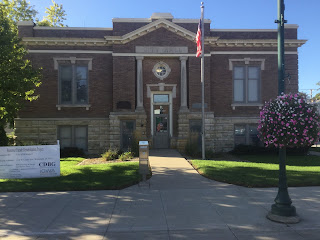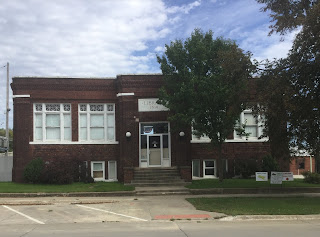Bike shops can be as amiable an environment as libraries and a welcome sanctuary similarly inhabited by people who find their work more of a pleasure than a burden. I would make them a regular visit along with the Carnegies, but it’s rare to find a bike shop in the small towns that are home to most Carnegies. Thus I was pleased to notice a bike shop across the street from the Carnegie in Perry, as I was in desperate need of work on my rear hub.
I had managed to obliterate the sealed cartridge of ball bearings on the side opposite the free wheel and had been riding for nearly one hundred miles with bearings on just one side, leaving me with an extremely wobbly wheel. I had to release my rear brake with a couple of inches of play in the wheel making high speed descents an act of faith. It was a miracle that my axle remained intact and that I could continue to pedal at all.
I was becoming accustomed to it, despite the considerable extra effort it took to pedal, especially uphill. I could have circled back to Des Moines and its many bike shops but had reconciled myself to pushing on to Council Bluffs and it’s Carnegie along with a couple of others along the way, even though it was one hundred miles away.
But then the bike shop in Perry popped up. I doubted it would have the obscure cartridge of bearings I needed for my rare 48-spoke tandem hub, but since I knew that Perry had a campground, I would be willing to stay over a day if the small part could be overnighted. Perry had a bike shop, as it is on the popular 89-mile Raccoon River Valley bicycle path that led to Des Moines. The trail is so popular that the new library in Perry had four bikes that could be checked out to ride the trail.
An older guy was working on a woman’s bike outside the shop. He said he could help me in a moment. He was a welcome site, as he promised to be a wizened mechanic with years of experience and know-how. Unfortunately, he was a retiree just helping out at the shop when the owner moonlighted at the local hospital as an ambulance driver. He had never seen a hub like mine. He rummaged through a box of bearings, but didn’t recognize any that would work.
He said it would be possible to order the part from Quality Bike Parts in Minneapolis, as I knew that is where my wizard of a mechanic, Joe of Quick Release in Chicago, had acquired the bearings when they last needed replacing over 50,000 miles ago, but he didn’t feel comfortable taking the axle out to determine what the bearings were on the still in tact side. I called Joe in Chicago hoping he could remember what they were, but it had been so long ago, he couldn’t precisely recall and paging through QBP’s catalogue didn’t help.
The part-timer called the shop owner to see if he was available for consultation. He couldn’t come to the shop, but I could meet him at the hospital a mile away. He had some expertise, but he’d never seen such a hub either, so didn’t know what to order and couldn’t dissect the hub there. He called a fellow bike shop owner 40 miles away who also worked on small engines, thinking he might have some knowledge and possibly the part. He too was flummoxed.
At this point I was wishing there hadn’t been a bike shop in Perry and that I’d just paid my respects to its Carnegie, now a museum, and had been on my way. But after putting this much effort into it I took the bike shop owner’s advice to try Kyle’s Bike Shop In Waukee, twenty miles away towards Des Moines also on the bike trail. He said there were two Kyle’s around Des Moines that had large inventories of parts and were staffed by knowledgeable mechanics. He also said there was a campground in Waukee.
It was a pleasant ride on the paved bike path, a former rail line. The only other cyclists were retirees, mostly solitary men in Lycra, but a few couples as well. There were two people on duty at Kyle’s, but neither were mechanics. The man with that expertise had the day off, but they assured me that he would surely have the solution to my problem, as he’d been wrenching over twenty years and even rode a tandem. He’d be in at ten the next morning. The campground was three miles away, putting me within five miles of an REI and a bike shop called Bike World a few miles further.
REI opened at nine, so I made it my choice. A young, inexperienced mechanic thought she had the solution, placing bearings into the broken cartridge and fitting a seal over it. It didn’t even last a mile. Rather than going back, since there was nothing she could do, I continued on to Bike World. The mechanic there was a genuine expert, regularly taking weekends off to go to races all over the country to work for domestic teams. He knew exactly what I needed. He didn’t have the part. He called the two other Bike Worlds and the nearer one, just seven miles away, had the part.
I didn’t want to get too excited, as I thought REI had answered my prayers, but when I walked into Bike World number two, a bag of the cartridges sitting on the counter looked like exactly what I needed. It took the mechanic, another woman, some effort to extract the broken cartridge, but she succeeded in the operation while I chatted with several other employees, one who knew all about the Carnegie in Cresco in the northeast corner of the state. It had recently been rehabbed by a team of Amish workers. There is a large community of them in the region.
It was my fifth bike shop in less than 24 hours and each had been a pleasure to hang out in. I had friendly conversations at all of them, even with an employee at REI who checked the serial number on my bike, under the pretense of entering it into my member profile, though it may have been to see if it ended up on some stolen directory.
Even though I’d had a shower at the campground the night before, he may have taken me as a homeless transient, as is the standard profile of the touring cyclist in the US. It is a stark contrast to France, where traveling by bike is a respectable and enviable pursuit. Even the hard corps cyclists at both Bike Worlds were somewhat suspicious of why I’d want to bike around Iowa. I was beginning to wonder the same thing the last few days as my bike got progressively more difficult to pedal, but I am now resurrected.
But this delay means I won’t be able to make a clean sweep of all the Carnegies in the state. I need to be back in Chicago by October 15 for a tribute at the Arts Club to the recently deceased Milos Stehlik of Facets. He passed away while I was in France. Tom Luddy, one of the founders of the Telluride Film Festival, will be in attendance. He lauded Milos in his pre-festival address to the staff, as did Ken Burns on another occasion during the festival, as Milos had been the chairman of the Board of Governors of the festival, which they also served on.
Before the Carnegie in Perry I limped along for twenty-five miles on the Covered Bridges Scenic Byway between the Carnegies in Winterset and Greenfield. Winterset is in the heart of Madison County where the movie starring Meryl Streep and Clint Eastwood was filmed. There weren’t any bridges on the highway, but signs pointed to several just off it. The Carnegie in Winterset is now it’s City Hall. It was unusual to see “City Hall” chiseled into the stone over the entry. Usually new tenants are content to let what was originally chiseled remain and let the building retain its birthright.
Winterset is also famous for being the birthplace of John Wayne. The main street through town is John Wayne Drive. Along with the attraction of the covered bridges and John Wayne’s home is also a Quilt Museum.
The Carnegie in Greenfield has also become a government building, this one housing the Chamber of Commerce. It is across the street and down the block from the new nondescript library that adjoins the city hall. It didn’t replace the old library because the town had outgrown it, but because the Carnegie had fallen into disrepair and it was going to cost too much to renovate and insulate it and put in an elevator.
There was still anger in the voice of the librarian twenty years later that she had lost her magnificent place of work and was now forced to spend her days in a setting as sterile as a dentist’s waiting room. She said the town cared so little for the old library that it would have been torn down had not a local couple bought it and turned it into a small business for a few years before it became home to the Chamber of Commerce.
My day in Des Moines hanging out in bike shops was a rare day of not dropping in on a library. It wasn’t until the next day, more than 48 hours since my visit to the Perry library that I made it to another library in Eldora more than sixty miles north of Des Moines. It was the town’s replacement to its Carnegie, which it had outgrown thirty years ago. The Carnegie faced the town’s towering Courthouse in its central plaza. It had served as a law office until three months ago when the lawyer retired. What will become of it is unknown. The new library had a fish tank on the circulation desk. It was a rare library that required signing in to use its WiFi. The password was “blackbox.“ I asked what the story was behind that. The librarian said she didn’t know, as her superior changed the password every day and turned off the WiFi when the library closed at night. I’m glad I won’t be camping near Eldora this night amongst such wary and suspicious folk.








No comments:
Post a Comment